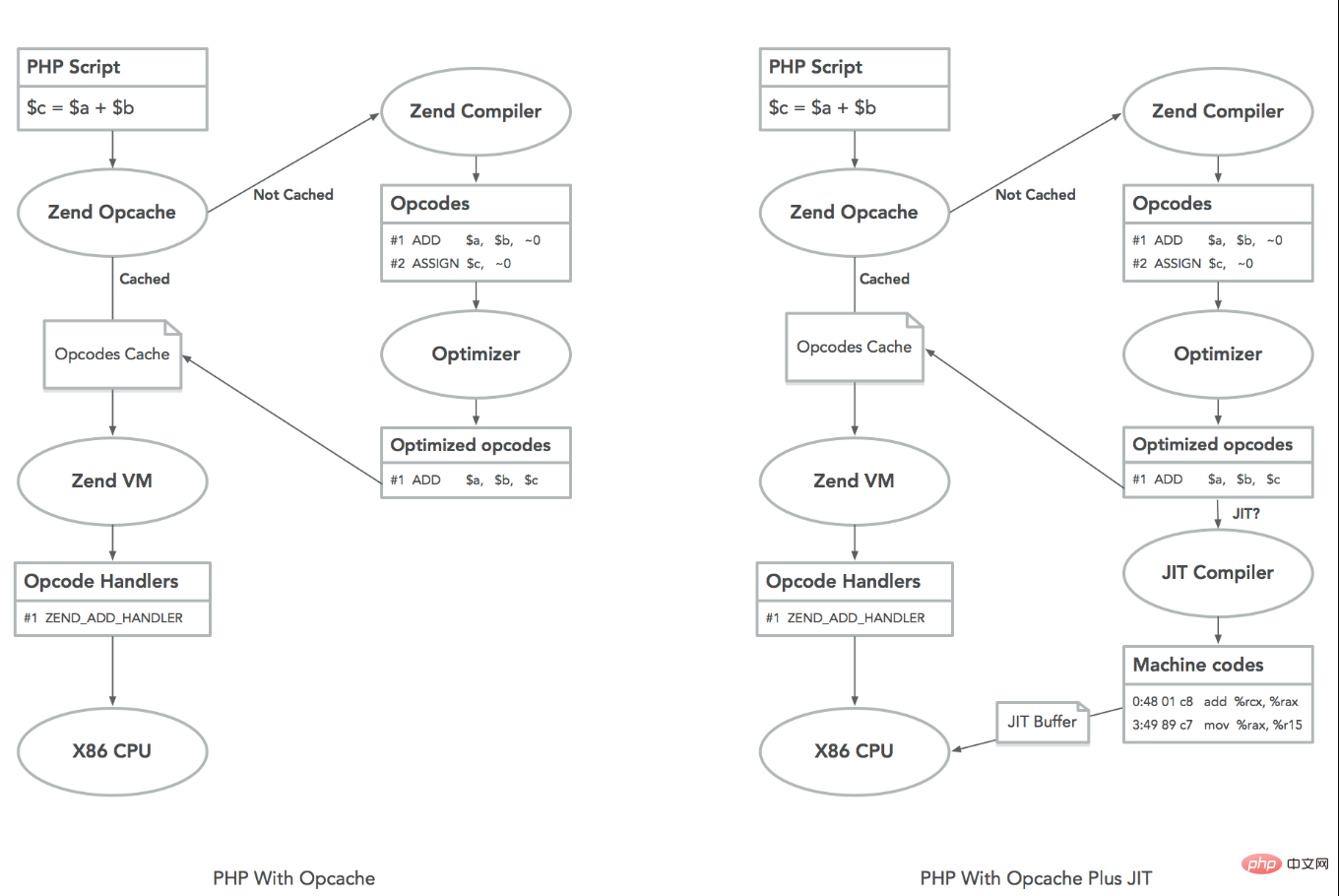 Backend Development
Backend Development
 PHP Tutorial
PHP Tutorial
 What is PHP JIT? Detailed graphic and text explanation of JIT, the new features of PHP8
What is PHP JIT? Detailed graphic and text explanation of JIT, the new features of PHP8
What is PHP JIT? Detailed graphic and text explanation of JIT, the new features of PHP8

PHP8 alpha1已经在昨天发布,相信关于JIT是大家最关心的,PHP8 JIT是什么,又怎么用,又有什么要注意的,以及性能提升到底咋样?
视频教程推荐:《PHP编程从入门到精通》
首先,我们来看一张图:

(右图有点错误就是,当JIT以后,下次请求的时候,会直接从JIT Buffer中读取执行,后续我把图改一下)
左图是PHP8之前的Opcache流程示意图, 右图是PHP8中的Opcache示意图, 可以看出几个关键点:
Opcache会做opcode层面的优化,比如图中的俩条opcode合并为一条
JIT在Opcache优化之后的基础上,再次优化,直接生成机器码
PHP8的JIT是在Opcache之中提供的
目前PHP8只支持x86架构的CPU
JIT是在原来Opcache优化的优化基础之上进行优化的,不是替代
事实上JIT共用了很多原来Opcache做优化的基础数据结构,比如data flow graph, call graph, SSA等,关于这部分,后续如果有时间,可以单独在写一个文章来介绍,今天就只是着重在使用层面。
下载安装好以后,除掉原有的opcache配置以外,对于JIT我们需要添加如下配置到php.ini:
opcache.jit=1205 opcache.jit_buffer_size=64M
opcache.jit这个配置看起来稍微有点复杂,我来解释下, 这个配置由4个独立的数字组成,从左到右分别是(请注意,这个是基于目前alpha1的版本设置,一些配置可能会随着后续版本做微调):
- 是否在生成机器码点时候使用AVX指令, 需要CPU支持:
0: 不使用 1: 使用
Copy after login - 寄存器分配策略:
0: 不使用寄存器分配 1: 局部(block)域分配 2: 全局(function)域分配
Copy after login - JIT触发策略:
0: PHP脚本载入的时候就JIT 1: 当函数第一次被执行时JIT 2: 在一次运行后,JIT调用次数最多的百分之(opcache.prof_threshold * 100)的函数 3: 当函数/方法执行超过N(N和opcache.jit_hot_func相关)次以后JIT 4: 当函数方法的注释中含有@jit的时候对它进行JIT 5: 当一个Trace执行超过N次(和opcache.jit_hot_loop, jit_hot_return等有关)以后JIT
Copy after login - JIT优化策略,数值越大优化力度越大:
0: 不JIT 1: 做opline之间的跳转部分的JIT 2: 内敛opcode handler调用 3: 基于类型推断做函数级别的JIT 4: 基于类型推断,过程调用图做函数级别JIT 5: 基于类型推断,过程调用图做脚本级别的JIT
Copy after login
基于此,我们可以大概得到如下几个结论:
尽量使用12x5型的配置,此时应该是效果最优的
对于x, 如果是脚本级别的,推荐使用0, 如果是Web服务型的,可以根据测试结果选择3或5
@jit的形式,在有了attributes以后,可能变为<
>
现在,我们来测试下启用和不启用JIT的时候,Zend/bench.php的差异,首先是不启用(php -d opcache.jit_buffer_size=0 Zend/bench.php):
simple 0.008 simplecall 0.004 simpleucall 0.004 simpleudcall 0.004 mandel 0.035 mandel2 0.055 ackermann(7) 0.020 ary(50000) 0.004 ary2(50000) 0.003 ary3(2000) 0.048 fibo(30) 0.084 hash1(50000) 0.013 hash2(500) 0.010 heapsort(20000) 0.027 matrix(20) 0.026 nestedloop(12) 0.023 sieve(30) 0.013 strcat(200000) 0.006 ------------------------ Total 0.387
根据上面的介绍,我们选择opcache.jit=1205, 因为bench.php是脚本(php -d opcache.jit_buffer_size=64M -d opcache.jit=1205 Zend/bench.php):
simple 0.002 simplecall 0.001 simpleucall 0.001 simpleudcall 0.001 mandel 0.010 mandel2 0.011 ackermann(7) 0.010 ary(50000) 0.003 ary2(50000) 0.002 ary3(2000) 0.018 fibo(30) 0.031 hash1(50000) 0.011 hash2(500) 0.008 heapsort(20000) 0.014 matrix(20) 0.015 nestedloop(12) 0.011 sieve(30) 0.005 strcat(200000) 0.004 ------------------------ Total 0.157
可见,对于Zend/bench.php, 相比不开启JIT,开启了以后,耗时降低将近60%,性能提升将近2倍。
对于大家研究学习来说,可以通过opcache.jit_debug来观测JIT后生成的汇编结果,比如对于:
function simple() {
$a = 0;
for ($i = 0; $i < 1000000; $i++)
$a++;
}我们通过php -d opcache.jit=1205 -dopcache.jit_debug=0x01 可以看到:
JIT$simple: ; (/tmp/1.php) sub $0x10, %rsp xor %rdx, %rdx jmp .L2 .L1: add $0x1, %rdx .L2: cmp $0x0, EG(vm_interrupt) jnz .L4 cmp $0xf4240, %rdx jl .L1 mov 0x10(%r14), %rcx test %rcx, %rcx jz .L3 mov $0x1, 0x8(%rcx) .L3: mov 0x30(%r14), %rax mov %rax, EG(current_execute_data) mov 0x28(%r14), %edi test $0x9e0000, %edi jnz JIT$$leave_function mov %r14, EG(vm_stack_top) mov 0x30(%r14), %r14 cmp $0x0, EG(exception) mov (%r14), %r15 jnz JIT$$leave_throw add $0x20, %r15 add $0x10, %rsp jmp (%r15) .L4: mov $0x45543818, %r15 jmp JIT$$interrupt_handler
大家可以尝试阅读这段汇编,比如其中针对i的递增,可以看到优化力度很大,比如因为i是局部变量直接分配在寄存器中,i的范围推断不会大于10000,所以不需要判断是否整数溢出等等。
而如果我们采用opcache.jit=1201, 我们可以得到如下结果:
JIT$simple: ; (/tmp/1.php) sub $0x10, %rsp call ZEND_QM_ASSIGN_NOREF_SPEC_CONST_HANDLER add $0x40, %r15 jmp .L2 .L1: call ZEND_PRE_INC_LONG_NO_OVERFLOW_SPEC_CV_RETVAL_UNUSED_HANDLER cmp $0x0, EG(exception) jnz JIT$$exception_handler .L2: cmp $0x0, EG(vm_interrupt) jnz JIT$$interrupt_handler call ZEND_IS_SMALLER_LONG_SPEC_TMPVARCV_CONST_JMPNZ_HANDLER cmp $0x0, EG(exception) jnz JIT$$exception_handler cmp $0x452a0858, %r15d jnz .L1 add $0x10, %rsp jmp ZEND_RETURN_SPEC_CONST_LABEL
这就只是简单的内敛部分opcode handler的调用了。
你也可以尝试各种opcache.jit的策略结合debug的配置,来观测结果的不同,你也可以尝试各种opcache.jit_debug的配置,比如0xff,将会有更多的辅助信息输出。
好了,JIT的使用就简单介绍到这里,关于JIT本身的实现等细节,以后有时间,我再来写吧。
大家现在就可以去php.net下载PHP8来测试了 :)
The above is the detailed content of What is PHP JIT? Detailed graphic and text explanation of JIT, the new features of PHP8. For more information, please follow other related articles on the PHP Chinese website!

Hot AI Tools

Undresser.AI Undress
AI-powered app for creating realistic nude photos

AI Clothes Remover
Online AI tool for removing clothes from photos.

Undress AI Tool
Undress images for free

Clothoff.io
AI clothes remover

Video Face Swap
Swap faces in any video effortlessly with our completely free AI face swap tool!

Hot Article

Hot Tools

Notepad++7.3.1
Easy-to-use and free code editor

SublimeText3 Chinese version
Chinese version, very easy to use

Zend Studio 13.0.1
Powerful PHP integrated development environment

Dreamweaver CS6
Visual web development tools

SublimeText3 Mac version
God-level code editing software (SublimeText3)

Hot Topics
 1675
1675
 14
14
 1429
1429
 52
52
 1333
1333
 25
25
 1278
1278
 29
29
 1257
1257
 24
24
 PHP vs. Python: Understanding the Differences
Apr 11, 2025 am 12:15 AM
PHP vs. Python: Understanding the Differences
Apr 11, 2025 am 12:15 AM
PHP and Python each have their own advantages, and the choice should be based on project requirements. 1.PHP is suitable for web development, with simple syntax and high execution efficiency. 2. Python is suitable for data science and machine learning, with concise syntax and rich libraries.
 PHP: A Key Language for Web Development
Apr 13, 2025 am 12:08 AM
PHP: A Key Language for Web Development
Apr 13, 2025 am 12:08 AM
PHP is a scripting language widely used on the server side, especially suitable for web development. 1.PHP can embed HTML, process HTTP requests and responses, and supports a variety of databases. 2.PHP is used to generate dynamic web content, process form data, access databases, etc., with strong community support and open source resources. 3. PHP is an interpreted language, and the execution process includes lexical analysis, grammatical analysis, compilation and execution. 4.PHP can be combined with MySQL for advanced applications such as user registration systems. 5. When debugging PHP, you can use functions such as error_reporting() and var_dump(). 6. Optimize PHP code to use caching mechanisms, optimize database queries and use built-in functions. 7
 PHP and Python: Comparing Two Popular Programming Languages
Apr 14, 2025 am 12:13 AM
PHP and Python: Comparing Two Popular Programming Languages
Apr 14, 2025 am 12:13 AM
PHP and Python each have their own advantages, and choose according to project requirements. 1.PHP is suitable for web development, especially for rapid development and maintenance of websites. 2. Python is suitable for data science, machine learning and artificial intelligence, with concise syntax and suitable for beginners.
 PHP in Action: Real-World Examples and Applications
Apr 14, 2025 am 12:19 AM
PHP in Action: Real-World Examples and Applications
Apr 14, 2025 am 12:19 AM
PHP is widely used in e-commerce, content management systems and API development. 1) E-commerce: used for shopping cart function and payment processing. 2) Content management system: used for dynamic content generation and user management. 3) API development: used for RESTful API development and API security. Through performance optimization and best practices, the efficiency and maintainability of PHP applications are improved.
 The Enduring Relevance of PHP: Is It Still Alive?
Apr 14, 2025 am 12:12 AM
The Enduring Relevance of PHP: Is It Still Alive?
Apr 14, 2025 am 12:12 AM
PHP is still dynamic and still occupies an important position in the field of modern programming. 1) PHP's simplicity and powerful community support make it widely used in web development; 2) Its flexibility and stability make it outstanding in handling web forms, database operations and file processing; 3) PHP is constantly evolving and optimizing, suitable for beginners and experienced developers.
 PHP and Python: Different Paradigms Explained
Apr 18, 2025 am 12:26 AM
PHP and Python: Different Paradigms Explained
Apr 18, 2025 am 12:26 AM
PHP is mainly procedural programming, but also supports object-oriented programming (OOP); Python supports a variety of paradigms, including OOP, functional and procedural programming. PHP is suitable for web development, and Python is suitable for a variety of applications such as data analysis and machine learning.
 PHP and Python: Code Examples and Comparison
Apr 15, 2025 am 12:07 AM
PHP and Python: Code Examples and Comparison
Apr 15, 2025 am 12:07 AM
PHP and Python have their own advantages and disadvantages, and the choice depends on project needs and personal preferences. 1.PHP is suitable for rapid development and maintenance of large-scale web applications. 2. Python dominates the field of data science and machine learning.
 PHP vs. Other Languages: A Comparison
Apr 13, 2025 am 12:19 AM
PHP vs. Other Languages: A Comparison
Apr 13, 2025 am 12:19 AM
PHP is suitable for web development, especially in rapid development and processing dynamic content, but is not good at data science and enterprise-level applications. Compared with Python, PHP has more advantages in web development, but is not as good as Python in the field of data science; compared with Java, PHP performs worse in enterprise-level applications, but is more flexible in web development; compared with JavaScript, PHP is more concise in back-end development, but is not as good as JavaScript in front-end development.



